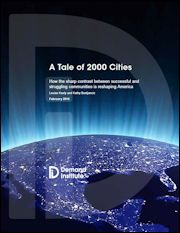 If you’re a homeowner hoping to see your house increase in value, or if you’re a local government looking for assessments and tax revenues to rise, Virginia is just about the worst state of the union to be in right now. According to a new projection of housing prices published by the Demand Institute, the price of the median house in Virginia will increase only 7% between 2015 and 2018, tied with New York for the third most abject performance in the country.
If you’re a homeowner hoping to see your house increase in value, or if you’re a local government looking for assessments and tax revenues to rise, Virginia is just about the worst state of the union to be in right now. According to a new projection of housing prices published by the Demand Institute, the price of the median house in Virginia will increase only 7% between 2015 and 2018, tied with New York for the third most abject performance in the country.
The lousy housing market for Virginia reflects the truly abysmal prospects for the state’s largest metropolitan region, Washington, which ranks at the very bottom of the list for the nation’s largest metros — an increase of only 3% over the three-year period. But it reflect weakness in the Richmond region as well, which is expected to see gains of only 6%. Hampton Roads is forecast to be among the stronger-performing regions, with 12% gains.
Some of the housing price rebound experienced in recent years has been driven by bottom feeding by institutional investors snapping up distressed properties to repackage as rentals, say Louise Keeley and Kathy Botjancic in “A Tale of 2000 Cities.” That force has largely played itself out. The prime driver now is household formation, which should snap back to 1.3 million net new households yearly, the report says.
Overall, housing construction will remain restrained. And the housing type will shift:
In every state … the number of single-family home completions will remain below the previous peak over the five-year period. This is to be expected, given that speculative fever pushed single-family housing construction well above what the underlying fundamentals could support over the longer term. By contrast, completions of multi-family homes will continue to rise in many states and remain at a higher share of total completions than pre-crisis, reflecting a shift in demand from owners to renters.
More multi-family housing? I’ll let you draw your own conclusions of what that means for the sprawl vs. urbanism debate.
— JAB


